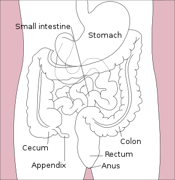Irritable Bowel Syndrome
What is Irritable Bowel Syndrome?
Irritable bowel syndrome is not a disease. It is a set of symptoms that affect people at different times in their lives. The symptoms come (flare-up) and go (subside). There are triggers that cause the symptoms to flare-up.
The large intestine is called the colon. With IBS, there is a problem with how the colon works. Water and nutrients from partly digested food move into the colon from the small intestine. The colon absorbs the water and nutrients. The rest slowly moves out of the body as a bowel movement (poop).
To have a bowel movement, the muscles in the colon and the rest of the body have to work together. If this process doesn’t work like it should, the contents of the colon don’t move as they should. It may move too fast, or too slow. This can cause cramps, bloating, constipation, or diarrhea. Some children are even sensitive to normal movement of the colon. They will feel cramps when gas or stool moves in their colon.
Why some people have IBS and others do not have it is not known. It does tend to run in families.
What causes it to flare-up?
Stress can speed up or slow down the movement in your colon. It can affect people with IBS. Stressful feelings also can be a trigger for IBS.
Food can also be a trigger. This can be different for each child. Some known triggers are:
- High fat meals. This includes fried foods, ice creams and other dairy products.
- Chocolate and caffeine.
- Carbonated beverages.
- Eating very large meals.
What are the symptoms?
Symptoms can come and go. Symptoms may be present every day for a few weeks or months. Then they may disappear for several weeks or months. Symptoms can include:
- Belly pain
- Bloating
- Loose stools, diarrhea or mucus in the stool.
- Constipation or straining to poop
- Stools that look different than normal
- Sudden urge to poop.
- Feeling like not finished when done pooping.
There is no test to diagnose IBS. Doctors often diagnose the problem by listening to a person describe the symptoms. The doctor may do some tests to rule out other diseases that are like IBS.
How is it treated?
There is no cure for IBS, but treatment can reduce symptoms.
Diet
- Reduce or stop foods that trigger IBS. It helps to keep track of what your child eats. This may help figure out what causes your child’s IBS symptoms.
- Have your child eat more fruits, vegetables, and high-fiber foods like beans, whole grain bread and cereals, and popcorn.
- Have your child eat 4 or 5 small meals during the day instead of 3 large meals.
- It is very important to drink water throughout the day. This will help avoid gas, bloating and constipation. Ask the doctor how much your child should drink.
Medicine
Talk with the doctor before giving your child medicines.
- Fiber supplements can help with constipation.
- Laxatives may be needed if your child is constipated.
- There is also medicine that may help your child if they have diarrhea.
- Your doctor may give your child medicine for pain, and help manage gas, constipation, diarrhea, and the sudden urge to poop.
Stress management
Learning how to handle stress can help kids with IBS. Try to have your child talk to you or their friends about their problems or stress. Relaxation exercises may help when feeling stressed. If a medical problem is causing stress, ask your child to talk with the doctor.
Let your child know that IBS is not a life-threatening disease. Talk with your child’s teacher to see if your child can have bathroom breaks as needed.
Cognitive behavior therapy and hypnotherapy have been shown to help manage IBS symptoms. Your doctor may suggest that your child be seen by counselor.



